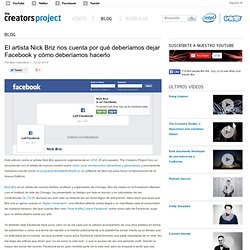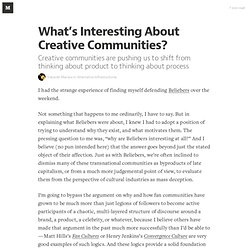

El artista Nick Briz nos cuenta por qué deberíamos dejar Facebook y cómo deberíamos hacerlo. Este artículo sobre el artista Nick Briz apareció originalmente en VICE.

El año pasado, The Creators Project hizo un documental con el artista de nuevos medios sobre cómo crear animaciones interactivas y generativas, y previamente habíamos escrito sobre su programa theNewAesthetic.js, un software de fácil uso para hacer composiciones de la Nueva Estética. Nick Briz es un artista de nuevos medios, profesor y organizador de Chicago. Briz da clases en la Fundación Marwen y en el Instituto de Arte de Chicago, ha presentado su trabajo por todo el mundo y es cofundador de las conferencias GLI.TC/H. Aunque por todo esto ya debería ser sin duda digno de admiración, debo decir que supe que Briz era un genio cuando vi “Apple Computers”, una efectiva afrenta contra Apple y un manifiesto para el consumidor de nuestros tiempos. Así que cuando Briz creó “How to/Why Leave Facebook” sobre cómo salir de Facebook, supe que no debía dejarlo pasar por alto.
Dotcom's Internet Party Wants to Abolish "Geo Blocking" Restrictions. Kim Dotcom's Internet Party has proposed drastic changes to New Zealand's "outdated" copyright law.

One of the key proposals is to legalize the circumvention of geo-blocking restrictions, so that Hollywood has an incentive to release content globally. In addition, the party also wants to get rid of Internet disconnections under the three-strikes law. Last January, exactly two years after the Megaupload raid, Kim Dotcom entered New Zealand’s political arena with the launch of his Internet Party. The party is currently preparing for the general election in September. While Dotcom will not be on the voting ballot himself, he remains one of the main influencers of the party’s policy.
As the name suggests, many of the party’s core issues revolve around the Internet, copyright included. One of the key issues the Internet Party wants to change is the liability New Zealanders face for using VPN services and other circumvention tools to access legal content. Hulu’s Geo Blocking. Revelador estudio: El sexo entre amigos fortalece la amistad. Martes 10 Septiembre 2013 Si usted tiene un amigo especial, ponga atención.

Un estudio realizado por una universidad estadounidense reveló asombrosos datos. Tras un estudio realizado a 300 personas, la universidad Boise State University reveló interesantes datos para todos quienes hemos tenido más de algún amigo especial, you know what i mean. Foto: Internet Los siguientes datos pueden hacerte cambiar de opinión, por eso te invitamos a ponerte cómodo y a estar atento: El 76% de los encuestados anunció que tener intimidad con un amigo, fortalece la relación de amistad.Un 20% señaló que ha tenido relaciones con al menos un amigo, mejorando de esta manera su amistad.El 50% de quienes comenzaron una relación seria con un amigo, la mantiene hasta la fecha.
Estas cifras manifiestan el cambio de mentalidad que las personas han experimentado con los años. Economics and the Commons Conference [knowledge stream] report – Mike Linksvayer. Economics and the Common(s): From Seed Form to Core Paradigm.
![Economics and the Commons Conference [knowledge stream] report – Mike Linksvayer](http://cdn.pearltrees.com/s/pic/th/conference-linksvayer-69459030)
A report on an international conference on the future of the commons (pdf) by David Bollier. Section on the knowledge stream (which I coordinated; pre-conference post) copied below, followed by an addendum with thanks and vague promises. First, video of the stream keynote (slides) by Carolina Botero (introduced by me; archive.org copy). III. “Treating Knowledge, Culture and Science as Commons” Science, and recently, free software, are paradigmatic knowledge commons; copyright and patent paradigmatic enclosures. Copyright and patent are not the first knowledge enclosures, but only “modern” enforcement of inequalities in what may be known and communicated?
These were the general questions that the Knowledge, Culture and Science Stream addressed. Maaaaaster. What’s Interesting About Creative Communities? — Alternative Infrastructures. I had the strange experience of finding myself defending Beliebers over the weekend.

Not something that happens to me ordinarily, I have to say. But in explaining what Beliebers were about, I knew I had to adopt a position of trying to understand why they exist, and what motivates them. The pressing question to me was, “why are Beliebers interesting at all?” And I believe (no pun intended here) that the answer goes beyond just the stated object of their affection. Just as with Beliebers, we’re often inclined to dismiss many of these transnational communities as byproducts of late capitalism, or from a much more judgemental point of view, to evaluate them from the perspective of cultural industries as mass deception. When examining the work of creative communities, it can be easy to dismiss this work from the point of view of products.
So sure, from the point of view of outputs, Beliebers are incredibly uninteresting. In Tufekci’s view, however, this is precisely the wrong approach.
Authorship (debates and cases) Social Media platforms. Open access. Campaigns anti-piracy. Creative industries. Amazon and national publishers... Collectong societies. Country regulations. Three/six-strikes. Sopa pipa acta. Breaking news: CISAC, others, gain partial cancellation of Commission decision. Mark Twain Quotes - BrainyQuote Mobile. Swartz.